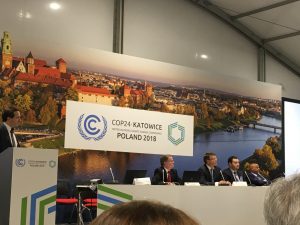While three days may not seem like much, it has been enough to completely shift my perspective on the feasibility of achieving binding, comprehensive agreements. The word I keep hearing thrown around is “small”. The agreement coming out of COP24, which is meant to include the adoption of the Paris Rulebook, has been growing smaller and smaller in scope.
 Before arriving at the COP, really before the start of the semester, I had what I now realize was an idealized vision of UNFCCC negotiations and outcomes. I assumed that parties negotiated over big picture issues, not between the words “should” and “shall”, and that the outcomes of such negotiations would be easily implemented. Upon studying the history of past agreements throughout the semester and attending multiple side events here in Katowice regarding the complexity of the technical aspects of the Paris Agreement, I know my original assumptions not to be the case.
Before arriving at the COP, really before the start of the semester, I had what I now realize was an idealized vision of UNFCCC negotiations and outcomes. I assumed that parties negotiated over big picture issues, not between the words “should” and “shall”, and that the outcomes of such negotiations would be easily implemented. Upon studying the history of past agreements throughout the semester and attending multiple side events here in Katowice regarding the complexity of the technical aspects of the Paris Agreement, I know my original assumptions not to be the case.
This realization, the realization that getting a substantive agreement passed by all parties and then creating a comprehensive and detailed mechanism to guide in achieving said agreement may be a nearly impossible task, has provided me the opportunity to begin to untint my rose-colored glasses.
After attending many hours of the High-Level Plenary and Talonoa Dialogue, I have heard again and again the importance of climate finance and increased ambition in mitigation goals, especially in light of the IPCC special report on 1.5 degrees. Even with these common themes, countries such as the United States, Saudi Arabia, and Russia have prevented consensus by refusing to acknowledge the legitimacy of this report. These actions further complicate the road to a comprehensive Paris Rulebook and clear the tinted glasses up a bit more.

U.S. Side Event on Open Energy Access Technology
Pulling the subject of this blog a bit closer to home, I would like to conclude with a discussion on some of the events and statements presented by the United States government. On my first day of COP24, I attended a U.S. sponsored side event that included Wells Griffith, the Principal Deputy Assistant Secretary for the Office of International Affairs, Steve Winberg, Assistant Secretary for Fossil Energy, as well as two members of the private sector, and the Australian Ambassador for the Environment Patrick Suckling. At this event, which was heavily protested, the panelists championed coal and natural gas (I’ll give credit for mentions of carbon capture and sequestration), and emphasized the importance of energy dependence and economic growth. In the official U.S. statement at the High-Level Plenary, these same messages were echoed with the edition of the phrase “protect the environment” tacked on at the end. In this statement, the IPCC report and climate finance—two of the most important issues for many developed and developing countries—were completely ignored.
These last few days have been an eye-opening, opportunity of a life time. I just wish that when it came time to leave, I would be able to return to a country whose actions throughout the past two weeks—perhaps past two years—made me proud.